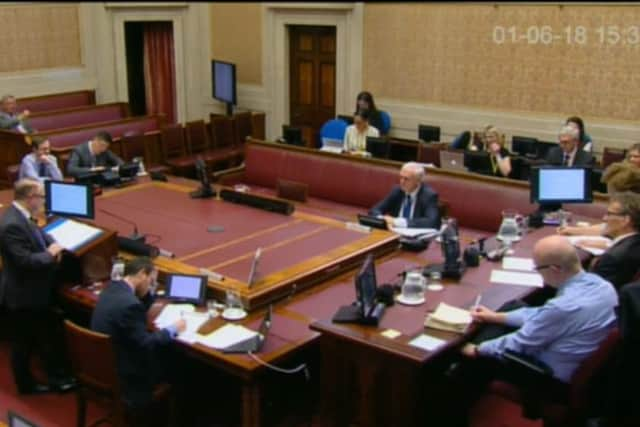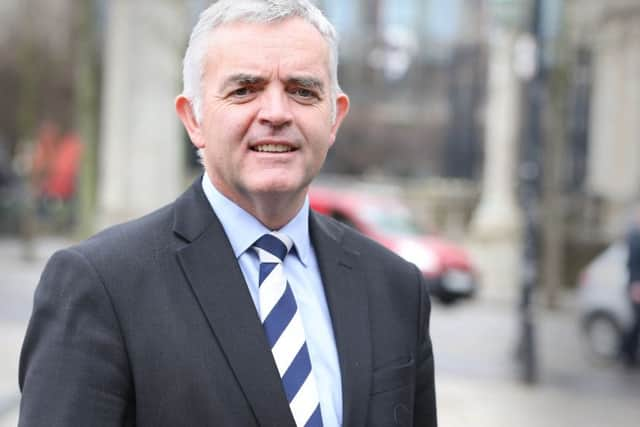RHI Inquiry: Internal DUP row '˜began in curry house, then erupted at breakfast'


Evidence opened at the RHI Inquiry today laid bare how Jonathan Bell “dismissed” his Spad Timothy Cairns in June 2015 after the blazing row began over dinner in a London curry house and continued over breakfast the next day ahead of a key meeting with a Whitehall minister.
That led to Mr Cairns – a long-standing DUP worker – not being in work for almost three weeks in a period where word of ‘cash for ash’ had become widespread and applications were piling into a scheme which had already breached its budget.
Advertisement
Hide AdAdvertisement
Hide AdSenior counsel to the inquiry David Scoffield QC said that Mr Cairns had been off work on a period of sick leave “which seems to have followed a particularly heated altercation with Mr Bell on 10 June at which Mr Cairns was dismissed by the minister”.


Mr Scoffield – who was today opening the third and fourth phases of the four-phase inquiry – said it was fair to say that there was “an extremely difficult relationship between Mr Cairns and Minister Bell, at least at various points in the period that we’re going to be looking at”.
“The evidence recounts that there was a trip to London on 9 and 10 June in order to have a meeting with the Secretary of State for DECC on 10 June – I think it was Amber Rudd at that stage.
“And it seems there was a heated discussion between Mr Bell and Mr Cairns on the evening of 9 June - I think that was over dinner in an Indian restaurant, to add a little colour to what happens then.
Advertisement
Hide AdAdvertisement
Hide Ad“There’s then a further altercation - at which some of the officials are present, at least for part of it, the next morning - at a Breakfast briefing before they go to meet the Secretary of State.


“That becomes very heated. I think the evidence is at that stage that a number of the officials, for instance the permanent secretary and others, are asked to leave the table. The debate continues and then it seems that Mr Cairns was then told by Mr Bell that he wasn’t coming to the meeting and Mr Cairns then asked the private secretary, Mr Kerr, to book him a flight and he flew home.
“So he didn’t go to the meeting and was then off for a period.”
Mr Scoffield said that although the meeting in London was not about RHI, there was some evidence that RHI was among the issues under debate during the dispute over dinner.
Advertisement
Hide AdAdvertisement
Hide AdHe said that immediately after returning to work, Mr Cairns had a meeting with Mr Bell and Peter Robinson’s senior Spad Timothy Johnston - now the DUP’s chief executive - at which “arrangements are discussed as to how things will proceed from now on”.


Later, recounting the lengthy delay in introducing cost controls even after the department knew the scheme was out of control, Mr Scoffield said that one of Mr Bell’s key contentions in his explosive December 2016 interview with Stephen Nolan - that the delay was despite firm objections from him - did not appear to be supported by the evidence of either Mr Cairns or Dr McCormick.
He said that from the evidence of both Mr Cairns and senior civil servant Andrew McCormick, at that point the permanent secretary of their department, “it seems that the debate was between the special adviser and the officials and then once there was some agreement there that package was presented to the minister for his approval.
“Mr Cairns’s evidence is that the minister accepted the advice without protest. And indeed Mr Cairns has also added, perhaps rather pointedly, the fact that the minister made no protestations about the advice given was not surprising, however, as in Mr Cairns’ experience the minister rarely read papers or briefing documents and accepted advice on most matters without question or comment”.
Advertisement
Hide AdAdvertisement
Hide AdSir Patrick Coghlin said: “You get the impression that the minister simply sat there while this debate went on until somebody said ‘right, that’s it’ and you think ‘sign off’.”
Mr Scoffield said that impression was “to some degree” also reflected in Dr McCormick’s evidence.
Sir Patrick said that “neither of them seems to suggest...that the minister took any significant active involvement in the debate”.
Mr Scoffield said there did not appear to be any record of the minister “protesting” at the time.
Advertisement
Hide AdAdvertisement
Hide AdThe QC went on to say that “the minister doesn’t appear to feature to any considerable degree in this time period at all”, something which requires “further explanation” as to whether it was due to his “travel commitments” or his “general ministerial style” or “something more manipulative, as Mr Bell asserts”.
Mr Scoffield said that Dr McCormick has referred to “the degree of mistrust between the minister and his special adviser was such that the situation was difficult for officials to read”.
Mr Scoffield said: “Indeed, one of the issues which the panel may feel compelled to consider is whether the relationship between the minister and the special adviser which is disclosed by the evidence which the inquiry has seen was so dysfunctional that it impeded the proper running of the department to the extent that it was wrong - if indeed this be the case - for their party to insist on them continuing to work together”.
Mr Scoffield also told the inquiry that DUP Spads and ministers tended to communicate in informal ways - such as phone calls, text messages or emails - and that many communications which once did exist had since been deleted.
That meant, he said, that there was “less of a paper trail than the inquiry at this remove may have liked to have seen”.